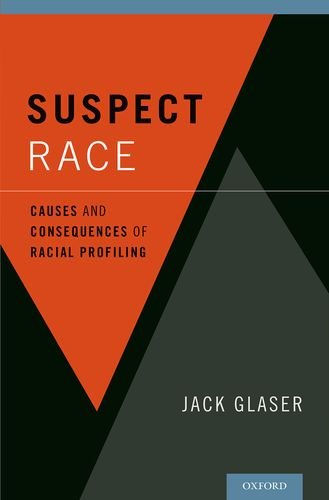SUSPECT RACE Offers New Insight into the Problem of Racial Profiling
Industry: Books
What is racial profiling? Why do police racially profile minorities? What can be done to solve the problem of racial profiling?
Berkeley, CA (PRUnderground) January 21st, 2015
SUSPECT RACE, Causes and Consequences of Racial Profiling, By Jack Glaser, PhD, Associate Professor and Associate Dean, Goldman School of Public Policy, University of California Berkeley
In SUSPECT RACE (Oxford University Press, December 2014, $33.24 hardcover, $26.59 Kindle) Jack Glaser, PhD, draws upon decades of research in criminology, history, psychology, and legal and policy analysis to present a broad and deep assessment of the causes and consequences of racial profiling. The result is the first in-depth and accessible explanation of this controversial and tragic phenomenon.
Concerned citizens and law enforcement officials who read SUSPECT RACE will come away with a better understanding of what racial profiling is, how it affects our society, and what we can do about it to prevent future tragedies.
Central to the issue of racial profiling is stereotyping. Stereotypes, even those operating outside of conscious awareness or control, can cause police to make discriminatory judgments about who to suspect, stop question, search, use force on, and arrest.
Glaser argues that stereotyping is a completely normal mental process. Unfortunately, it leads to undesirable, discriminatory outcomes. Like the rest of us, police officers are normal human beings with normal cognition; they are therefore influenced by racial stereotypes that have long connected minorities with aggression and crime. Efforts to merely prohibit racial profiling are inadequate solutions to this problem.
Additionally, Glaser finds evidence that racial profiling can actually increase crime, and he considers the implications for both counterterrorism and drug-war profiling. Finally, he examines the policy landscape in which racial profiling resides and calls for improved data collection and supervision, reduced discretion, and increased accountability.
 SUSPECT RACE offers timely insights and proposes realistic solutions to many of the controversial problems surrounding racial profiling including:
SUSPECT RACE offers timely insights and proposes realistic solutions to many of the controversial problems surrounding racial profiling including:
· What exactly is racial profiling? The term is used everywhere but not everyone has the same definition. Even reputable scholars find it hard to pin down the best definition for it.
· How does racial profiling happen and why?
· Can racial profiling actually result in an increase in crime?
· The effects of racial profiling: Are there any benefits to be had? What are the costs of stereotyping?
· Does racial profiling serve or hinder the War on Terror?
· Does racial profiling do more to exacerbate or resolve America’s problems in waging the War on Drugs?
· What affirmative steps can law enforcement take to reduce the effects of stereotypes about groups on police decisions about individuals?
SUSPECT RACE gives readers not only a scholarly but also a useful account of racial profiling, showing them how to understand better and how to deal with it more effectively.
About Jack Glaser
Jack Glaser received his PhD in psychology from Yale University in 1998 and is a professor at the Goldman School of Public Policy at the University of California, Berkeley. He conducts research on stereotyping, prejudice, and discrimination, examining phenomena ranging from unconscious thoughts, feelings, and motives to discriminatory behaviors like racial profiling and hate crimes.




